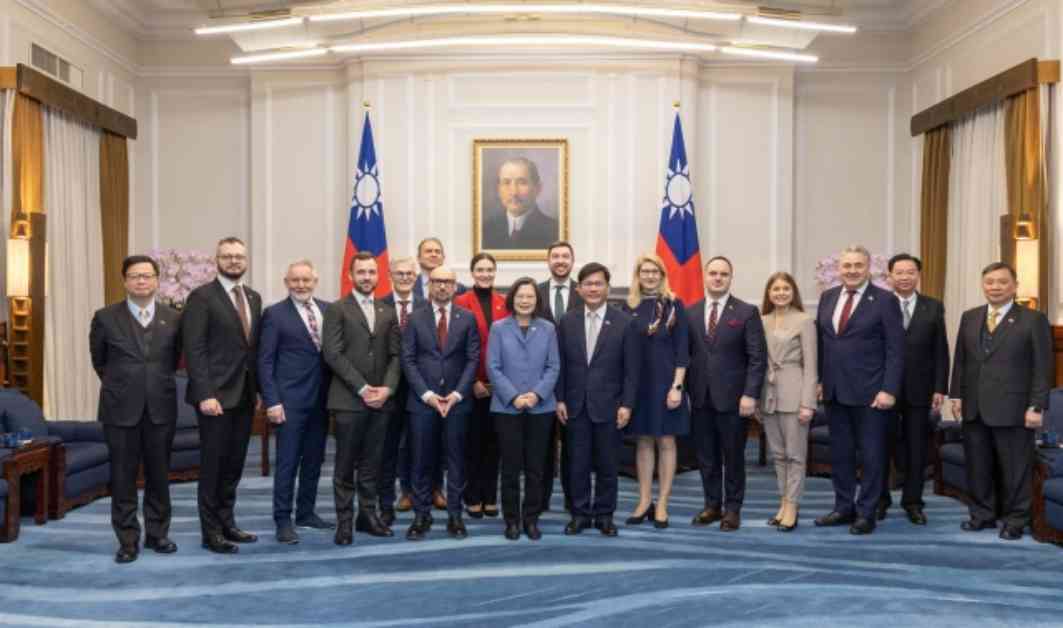Taiwan’s Unofficial Diplomacy in Eastern Europe: Navigating Complex Relations Under Tsai Ing-Wen
As the world eagerly watches the Olympic Games unfold in Paris, the issue of Taiwan’s global participation has once again taken center stage. Athletes from the island nation are compelled to compete under the name ‘Chinese Taipei’, a restriction that is not imposed on any other competing nation or territory. Spectators are forbidden from displaying banners or flags to support their nation, and in some cases, they are even forcefully prevented from doing so—a blatant display of unfair treatment that underscores the challenging diplomatic position faced by Taiwan.
Despite Taiwan’s significant economic contributions and steadfast commitment to democratic values, the island nation is hampered in its efforts to establish formal relations with most countries worldwide, largely due to pressure exerted by its formidable neighbor across the strait. China has employed a range of economic, political, and even physical measures to limit Taiwan’s diplomatic space on the global stage, making it difficult for the nation to secure formal recognition.
Following the shift of diplomatic recognition to the People’s Republic of China by North Macedonia in 2001, the Holy See remains the only European nation with formal ties to the Republic of China (Taiwan). Despite the European Union being Taiwan’s largest foreign investor and 4th largest trade partner by volume, establishing diplomatic connections has proven to be a formidable challenge. While Taiwan maintains diplomatic presence through ‘Taipei Representative Offices’ in various countries, including one in London, these offices often face additional scrutiny and questions about their legitimacy compared to diplomatic missions of other nations. To comply with China’s demands regarding the ‘One China Policy’, these offices are often framed as centers for ‘economic’ and ‘cultural’ exchanges rather than political entities, despite performing similar functions to official embassies such as issuing visas and representing national interests.
Taiwan has adopted a flexible approach in fostering ties through ‘unofficial relationships’, making significant strides in trade, technology, education, and human rights despite the absence of formal embassies in many countries. This approach has been particularly prominent during President Tsai Ing-Wen’s tenure, a period marked by dynamic shifts in the international diplomatic landscape amidst the challenges posed by the Covid-19 pandemic, the rise of ultra-nationalism, and China’s increasing efforts to isolate Taiwan globally.
Building on the successes of the New Southbound policy and collaborations with traditional allies like Japan and the United States, the Tsai administration has actively engaged with Eastern European countries—a region with a shared historical memory of authoritarian threats, revisionist imperialism, and communism. Eastern European nations, once subjugated under the Warsaw Pact, now find themselves united in concerns about the Russo-Chinese alliance and the escalating tensions between Russia and Ukraine. Proximity to Russia and the conflict in Ukraine has heightened their sense of threat and urgency for strategic action, prompting them to seek allies who share democratic values and support their pursuit of strategic autonomy.
The Eastern European nations, now under NATO, are actively seeking allies with shared democratic values across the globe. Collaborations on arms supply, technology, and economic interactions are integral to their pursuit of strategic autonomy and reducing reliance on external powers. This presents an opportunity for East Asian nations, including Taiwan, to engage in economic and technological exchanges, opening doors for market access and diplomatic outreach. For instance, South Korean arms sales to Poland involving advanced weaponry and technology transfer underscore the potential for increased cooperation between Eastern Europe and East Asia.
The relationships between Eastern European nations and Taiwan vary, reflecting the diverse approaches these countries have taken in managing risks and relations with China. Despite challenges, Taiwan has successfully deepened ties with countries like Lithuania, Poland, and the Czech Republic through robust economic agreements, legislative visits, and cooperation across various sectors. Lithuania’s decision to establish the ‘Taiwanese Representative Office in Lithuania’, a groundbreaking move that elevated Taiwan’s diplomatic status, exemplifies the progress made in forging closer ties with Eastern European nations.
In contrast, countries like Hungary, led by Prime Minister Viktor Orbán, have pursued closer ties with China, complicating their engagement with Taiwan. Despite aligning with China on various issues and rejecting Taiwan’s bid for WHO accession, Hungary maintains pragmatic and stable unofficial relations with Taiwan, fostering economic interactions and cultural exchanges. Taiwan’s ability to navigate complex diplomatic landscapes and engage with countries like Hungary underscores its commitment to pursuing unofficial diplomacy to advance its interests in the region.
With the transition to the Lai administration, Taiwan’s unofficial diplomacy in Eastern Europe is expected to intensify, with an emphasis on official visits and engagements. The recent visit by then vice-president-elect Hsiao Bi-khim to the Czech Republic, Poland, and Lithuania, along with reciprocal visits by legislators, signals a growing momentum in official interactions between Taiwan and Eastern European nations. However, China’s economic and political pressure on these countries, coupled with ongoing hybrid warfare and disinformation campaigns, pose significant challenges to Taiwan’s diplomatic efforts.
As Taiwan seeks to strengthen its ties with Eastern European nations, it must navigate economic complexities and potential pushback from business leaders wary of upsetting China. Collaboration with multinational organizations like the EU, combating disinformation, and establishing bilateral agreements will be crucial in maintaining the positive trajectory of Taiwan’s unofficial diplomacy in the region. The steadfast commitment of Taiwan and European nations to uphold democratic values and forge meaningful partnerships will be essential in navigating the evolving geopolitical landscape and promoting stability in an increasingly uncertain world.












